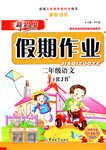题目内容
In the dining room of my grandfather's house stood a giant grandfather clock.Meals in that dining room were a time for four generations to become one.The table was always spread with food containing love as the main ingredient.And that grandfather clock stood like an old family friend, watching over the laughter that was a part of our lives.
As a child, the old clock fascinated me.I watched and listened to it during meals.Even more wonderful to me was my grandfather's routine.He wound (上发条) that clock with a special key carefully each day.That key was magic to me.It kept our family's magnificent clock ticking and chiming.I remember watching as my grandfather took the key from his pocket and opened the hidden door in the clock.He inserted the key and wound — not too much, nor too little.He never let that clock wind down and stop.He showed us grandchildren how to open the door and let us each take turns winding the key.I remember the first time I did it I was so excited to be part of this family routine.
After my grandfather died, it was days after the funeral before I remembered the clock!
"Mama! The clock! We've let it wind down."
The tears flowed freely when I entered the dining room.The clock stood there quiet.It even seemed smaller without my grandfather's special touch.
Some time later, my grandmother gave me the clock and the key.The old house was quiet.No laughter over the dinner table, no ticking or chiming of the clock — all was still.I took the key in my shaking hand and opened the clock door.All of a sudden, I was a child again, watching my grandfather with his silver-white hair and blue eyes.He was there, winking at me, at the secret of the clock's magic, at the key that held so much power.
I stood, lost in the moment for a long time.Then slowly and carefully I inserted the key and wound the clock.It came back to life.Tick-tock, tick-tock, life and chimes were breathed into the dining room, into the house and into my heart.In the movement of the hands of the clock, my grandfather lived again.
- 1.
Why does the writer say the table was always spreading with food containing love as the main ingredient?
- A.The food was delicious and tasty.
- B.The meal was made by his dear grandparents
- C.The whole family talked about the love of each other over meals.
- D.Four generations lived joyfully and harmoniously to become one.
- A.
- 2.
By describing Grandfather’s routine in detail in the 2nd paragraph, the writer expresses___________.
- A.It’s troublesome to make the clock work.
- B.It’s a fantastic thing to play with the clock.
- C.He greatly misses his late grandfather
- D.His grandfather had a preference for the clock.
- A.
- 3.
What kinds of mood are shown in the essay?
- A.Sad and hopeful
- B.desperate and hopeful
- C.Heart-broken and hopeless
- D.cheerful and hopeful
- A.
DCA

练习册系列答案
 学练快车道快乐假期寒假作业系列答案
学练快车道快乐假期寒假作业系列答案 新思维寒假作业系列答案
新思维寒假作业系列答案
相关题目